Is Fish or Beef Collagen Better
If you are reading this, it probably means you are no stranger to the benefits of collagen! But for some of us in the community, it is important to know where the source comes from. We are going to do two things in this article: to compare pig and fish collagen, and to look at the list of the favourite Japanese products to see if the collagen originate from pork or fish.
Part 1:
Comparing Pig and Fish Collagen
Collagen can come from a number of sources, for example fish, pigs, cows and chickens. Of course, you will find that most of the supplements in the market are either fish- or pig-based. Let's look at both types before we start comparing them.
Fish collagen
Fish collagen (sometimes known as marine collagen) can be extracted from either the scales or the bones of fishes. However, the collagen extracted from the bones are less damaged than from the scales, which means that it is more effective for us when it is extracted from the bones. Some products in the market do have a fishy smell to it, but fish collagen is generally preferred over the pig counterpart because the body is able to absorb fish collagen more easily.
Other than how effective our bodies absorb the two types of collagen, the amount of hydroxyproline is also different in both. Hydroxyproline is a characteristic amino acid, which studies in recent years have shown that hydroxyproline plays an important role in the creation of collagen.
Pig collagen contains about 2 times more hydroxyproline than in fish collagen.
Pig collagen
Fish and pig collagens have different effects on the regeneration of your skin membrane.
When females go past the age of 30, many will find their skin membrane do not regenerate as well. By absorbing pig collagen, it is able to protect the skin from drying, and effectively maintain the youthful skin.
Well, what is pig collagen? It is collagen that is extracted mainly from the skins of pigs. Though it is said that the secret of the longevity of the Okinawan people comes from eating pigs, when in actual fact it is the composition of animo acid from pigs that is highly similar to humans, and is what eases the absorption of the collagen.
Beef collagen used to be very popular too, but due to the Mad Cow disease in early 2000s, demand shifted towards the pig counterparts. However, since there is not enough pigs, this lead to using fish as the other source. Collagen coming from pigs are considered very valuable.
Pig Collagen has demerits?
But pig collagen has two demerits, one of which is the effectiveness of how it can be absorbed by the intestines.
Collagen consumed is usually not absorbed until the digestive enzymes in the stomach breaks it down into amino acids, from which the intestine can then absorb. Fish collagen is seven times easier to break down compared to pig collagen, making it much easier to absorb.
Along comes low molecular weight collagen to solve this. The low molecular weight collagen has already been broken down beforehand, which means that it can even skip being broken down by digestive enzymes, and be readily absorbed by the body at the stage of absorption.
The other demerit is the smell of pigs could still remain. However, the ingenuity of collagen makers has been able to suppress the smell in their supplements. If the smells of the supplement matters a lot to you, you'd want to go for collagen made from the first extraction batch of pig collagen, as they have the least smell.
Misconceptions
For products that use fish collagen, sometimes you will see comments from users like "Collagen originating from fish is safe, while from pig it is not.". However, how safe a product is has nothing to do with whether it's from fish or pig. Stringent checks are conducted to ensure safety and quality, even when collagen is extracted from pigs.
Another misconception is that one collagen dissolves better than the other. Experiments has been done before by users, and there is no sign of how difficult collagen powders dissolves, or if one dissolves better than the other.
Part 2:
We shall now look at a few popular Japanese collagen products, take a look at their websites, and find out if they are of fish or pig origins.
This is not a comparison or ranking in anyway, so the order the products introduced has no bearing on preference. So how do you know which collagen to pick and use? No way but to take the hard way of trying it out! Even the most popular collagens may not work for some people, which could be due to lifestyle, diet or the formulation just doesn't work for them.
DHC Collagen Supplement
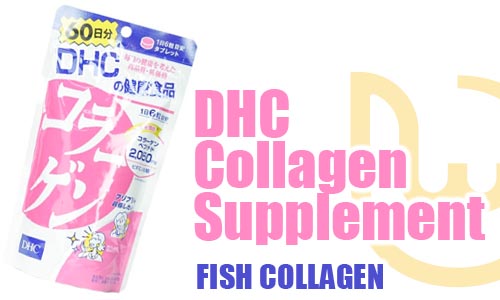
DHC Collagen comes in tablet form, and will last you for 60 days.
It is the choice for anyone who place cost as a priority. This fish-derived supplement is suitable if you want to keep your intake costs low in the long run. Note that while the recommended collagen amount for beauty upkeep is 5,000mg of collagen per day, DHC Collagen provides only about 2,050mg.
Meiji Amino Collagen Powder Regular Can
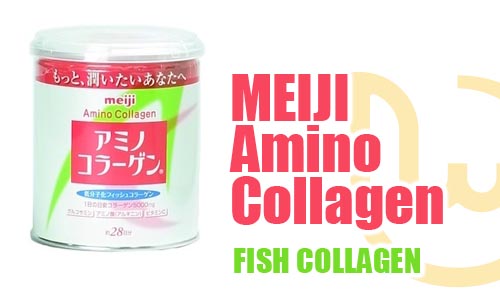
Here is the ever-popular Meiji Amino Collagen.
What makes this popular, is that the ingredients works in synergy with the low molecular fish collagen, maximising the effectiveness of the formulation to improve your overall skin condition and strength. These include Amino acid, glucosamine and vitamin C.
Two different cans: Meiji and Meiji Premium?
What are the differences between the two cans? Both are about the same in formulation, except that the premium version has additional hyaluronic acid and Coenzyme Q10. Hyaluronic acid is a moisturising ingredient, which means it attracts and retains moisture, and will give your skin a youthful, bouncy look.
By the way, both cans come with a 7g spoon. Each can will last you for about one month.
There is a conflict on the internet to how Meiji collagen powder tastes. Some say it's fishy, some say it's plain. Fujikawa-sensei and I have tasted it, including mixing it with plain water, but we couldn't detect any fishy taste. But our boss Mizuguchi-san drank it with milk, and it didn't taste good. We'd suggest not mixing it with milk or milk-derived beverages.
FANCL HTC Collagen Powder DX
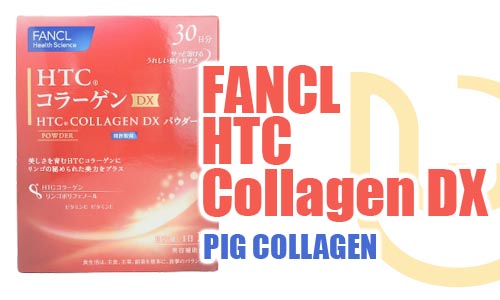
FANCL's HTC Collagen comes in a variety, including drinks, powder sticks and tablets. For the powder sticks, one box will last you for 30 days (for 1 stick everyday). Reviews say that there is no taste or smell.
FANCL combines Apple polyphenols into their collagen, which their labs have discovered that can protect the skin from damaging UV rays. This creates a double benefit of protection for your skin from premature aging, and of healthy skin support from the supplement.
FINE JAPAN Hyaluron & Collagen
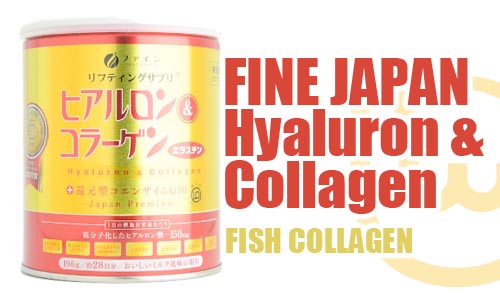
FINE Hyaluron & Collagen is also quite popular in Japan. This can also comes with a spoon, so you don't have to worry about the serving size.
FINE's main attraction is its high content of Hyaluronic Acid, important for attracting and retaining moisture. Compared to its competitiors, it has about five times more HA component. One of the recommendations, is to tackle dry skin resulting from aging, as our HA production decreases with age.
One can is one month's supply. Do take note of what drinks you decide to add this supplement into as it is formulated to have a taste of milk. Also, if you have an allergy with milk, you are going to have to choose an alternative.
ASAHI Perfect Asta Collagen Powder
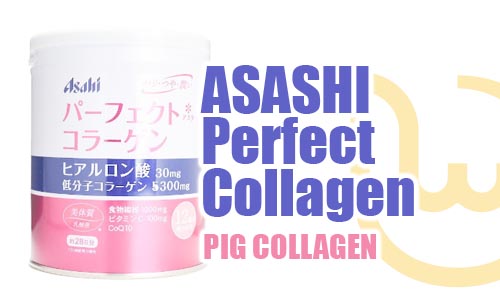
The ASAHI Perfect Asta Collagen has an exclusive component called the "Beauty Body Constitution Lactic Acid Bacteria", which supposedly allows our bodies to absorb the collagen efficiently, while supporting the production of hyaluronic acid. Take note that this collagen is of pig origins, and of how long Japanese naming can get.
This is a 28-day supply, and comes with a serving spoon. The taste is plain, so you can add this to any food or drinks.
SUNTORY MILCOLLA
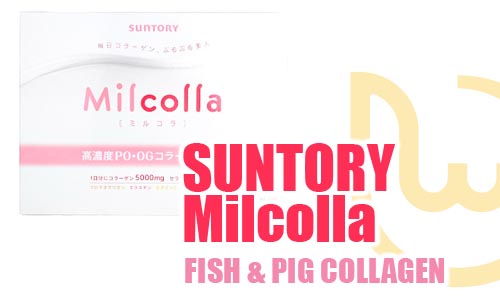
SUNTORY is quite unique. Not only having collagen originating from pigs, Suntory has their own PO・OG collagen mixed into the formula which originates from fish.
The Milcolla has a milk taste, but without the distinctive smell to it. It comes in a box of 30 sticks, which you can easily carry around too.
ORIHIRO Placenta Collagen
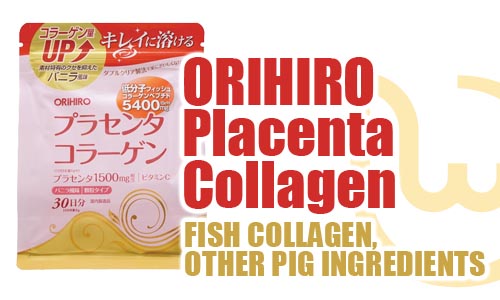
The ORIHIRO Placenta Collagen is similar to the ORIHIRO Low Molecular Hyaluronic Acid Collagen, in that each serving has 5,400mg, more than the other supplements introduced here.
The suggested ways of consuming this include mixing with coffee, yogurts, and ice-cream! The reason behind this is because it has a vanilla flavor, and is stronger on the sweet side.
Also note that while the collagen comes from fishes, the formulation includes pig placenta essence.
The pack does not come with a spoon.
ORIHIRO Low Molecular Hyaluronic Acid Collagen
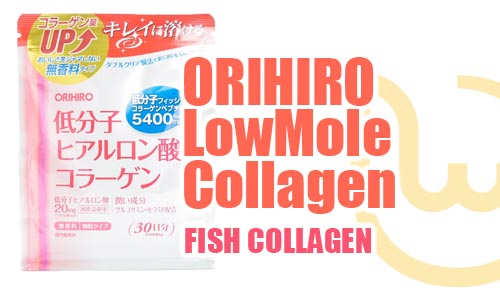
Unlike the ORIHIRO Placenta Collagen, this has no ingredients that is derived from pork.
Among the collagens, this has the most amount of collagen at 5,400mg per serving. So if the collagen amount is your thing, this is what I'd suggest. This Low Molecular HA Collagen also contains moisturising components of glucosamine and ceramide.
Do note that the pack does not come with a spoon. One pack will last 30 days.
SHISEIDO The Collagen
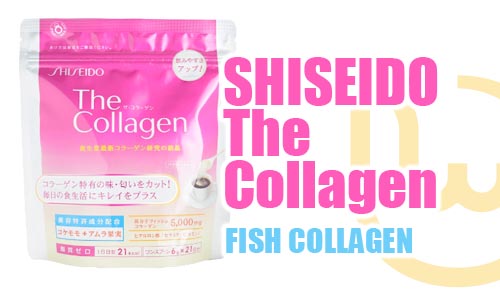
SHISEIDO's The Collagen is made from its own special formulation that includes Lingonberries and Alma fruits. Lingonberries and Almas are known for their high levels of polyphenols, which gives collagen an anti-aging benefit. In fact, Alma has 30 times more polyphenols than red wine itself!
The pack comes a 6g spoon, and will last you for 21 days.
How was your journey in understanding more about some of the most popular collagen in Japan? Drop us a message or comment if there's something you want to know more. Who knows, maybe there'd be a part 2! Till next week, see you!


easterlingforer1944.blogspot.com
Source: https://wonect.life/pig-collagen-vs-fish-collagen-what-brand-contains-which/
0 Response to "Is Fish or Beef Collagen Better"
Post a Comment